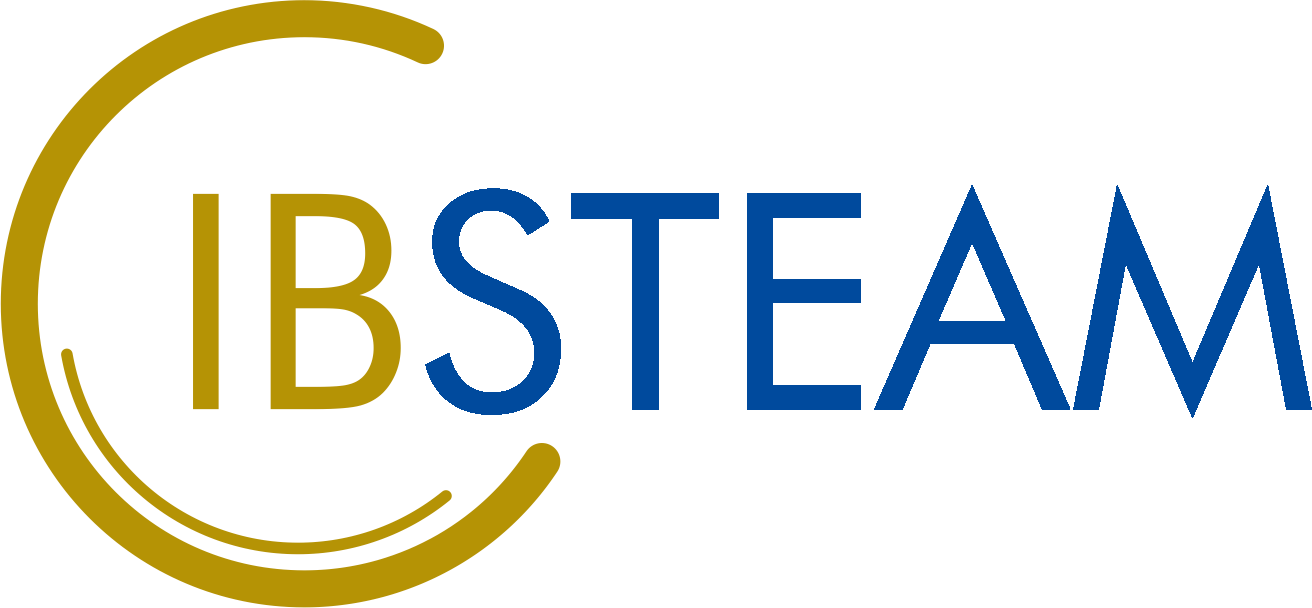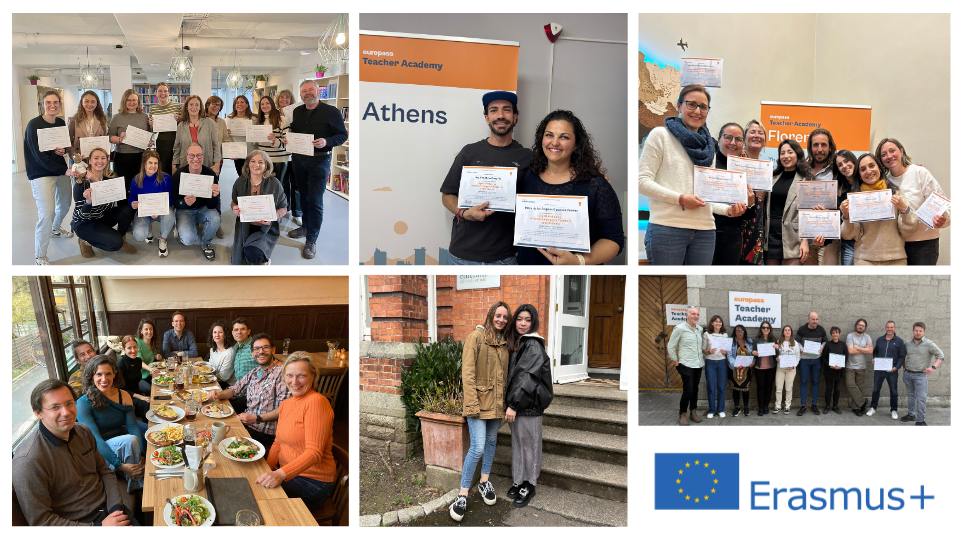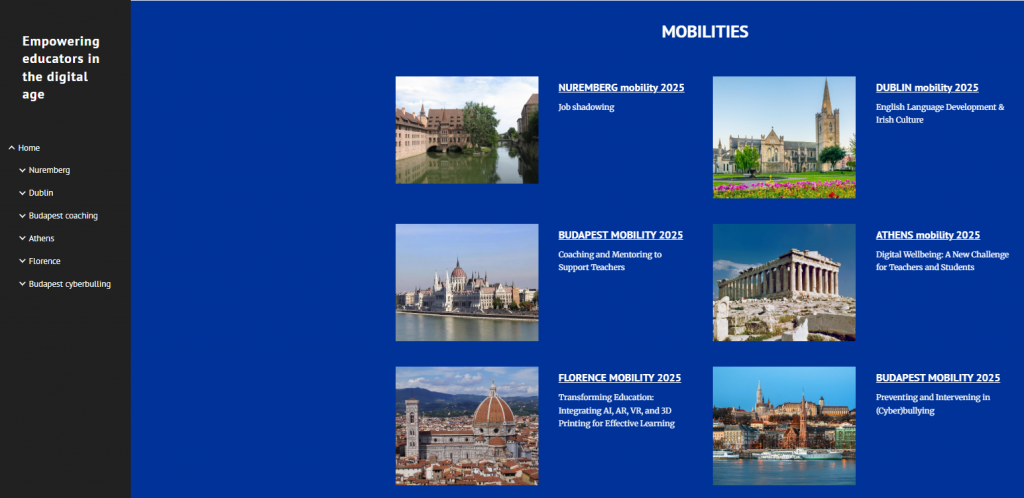
Erasmus+ project 2023-1-ES01-KA121-SCH-000131575
- Conèixer el procés de transformació digital dels centres educatius en altres països europeus per a instaurar bones pràctiques i protocols en els centres educatius de la nostra comunitat autònoma.
- Millora del coneixement de metodologies actives amb utilització de tecnologies digitals.
- Millora de la competència per crear recursos en format digital i en obert.
- Millora de la competència de protecció de dades personals, privacitat, seguretat i benestar digital.
- Millora de la competència lingüística en anglès per augmentar la internacionalització de l’equip i reforçar la dimensió europea.
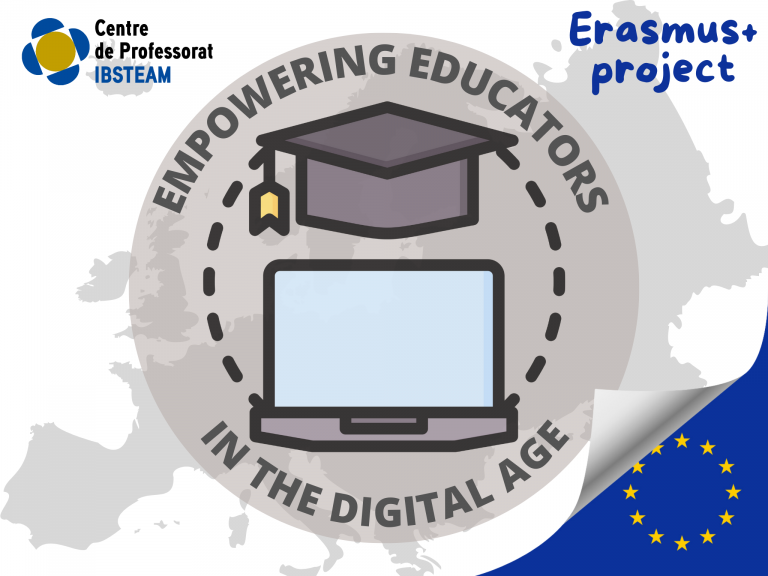
Mobilitats curs 2024/25
A mesura que les IA es multipliquen i augmenten les seves àrees d’expertesa, els estudiants les trobaran més sovint en el futur, fins i tot en les seves futures carreres. Això planteja dubtes sobre el futur i com els professors poden utilitzar la IA per millorar l’aprenentatge i el benestar dels estudiants. També s’exploren formes d’identificar i donar suport als estudiants amb dificultats i automatitzar tasques rutinàries com la correcció.
El curs es dirigeix a professors de diferents matèries (STEAM, llengües, ciències socials i història) i els ensenya a utilitzar aplicacions edTech i eines d’IA per crear experiències d’aprenentatge dinàmiques que ajudin els estudiants a explorar temes complexos. S’imparteix a través d’instrucció directa, activitats pràctiques i discussions en grup, amb l’objectiu de desenvolupar plans de lliçó que incorporin la IA.
Cada dia hi ha una “discussió del dia” perquè els participants posin en pràctica els seus coneixements, comparteixin idees i desenvolupin projectes col·laboratius entre escoles. Al final del curs, els professors entendran profundament com utilitzar la IA per millorar les diferents assignatures i crear lliçons innovadores.
Objectius del curs:
- Adquirir una comprensió sòlida de les tendències emergents i tecnologies en IA per a l’educació K-12.
- Desenvolupar plans de lliçó que integrin la IA en aules K-12.
- Explorar com utilitzar la IA per promoure el pensament crític, la creativitat i la col·laboració.
- Avaluar l’aprenentatge dels estudiants amb la IA.
 Els passats dies 4 i 5 de novembre de 2024, els nostres assessors del CEP IBSTEAM, Tomeu Mascaró i Maria Lluïsa Quetgles, van visitar la Universitat Friedrich-Alexander (FAU) de Nuremberg, Alemanya, en una trobada preparatòria pel projecte de job shadowing que s’iniciarà pròximament. Aquesta visita ha tingut com a objectiu principal establir vincles de col·laboració per enfortir la competència digital del professorat balear mitjançant un intercanvi de bones pràctiques amb la FAU.
Els passats dies 4 i 5 de novembre de 2024, els nostres assessors del CEP IBSTEAM, Tomeu Mascaró i Maria Lluïsa Quetgles, van visitar la Universitat Friedrich-Alexander (FAU) de Nuremberg, Alemanya, en una trobada preparatòria pel projecte de job shadowing que s’iniciarà pròximament. Aquesta visita ha tingut com a objectiu principal establir vincles de col·laboració per enfortir la competència digital del professorat balear mitjançant un intercanvi de bones pràctiques amb la FAU.
Durant les sessions amb el professorat de la FAU, s’han explorat enfocaments innovadors per aplicar el pensament crític en l’ús de la IA en educació, així com estratègies per promoure una experiència digital saludable i equilibrada en entorns d’aprenentatge. Aquesta col·laboració ens permetrà dotar el professorat de les Illes Balears amb eines pràctiques per integrar aquestes competències als centres educatius.
Aquest projecte de job shadowing, previst per la primavera de 2025, suposa un pas endavant en el nostre compromís d’oferir una educació digital segura i ètica, contribuint a la transformació educativa a través del programa Erasmus+.
Description:
The English Language Development & Irish Culture course provides an enriching blend of English language learning and cultural exploration. Tailored for learners with at least an A2 level of English, this course aims to enhance communication skills while offering a deep dive into Ireland’s rich cultural heritage. Morning sessions focus on developing essential language skills, including speaking, listening, reading, and writing, in a supportive and engaging classroom environment. Afternoons are dedicated to discovering the many facets of Irish culture, with interactive modules and activities that delve into local traditions, from lively festivals and traditional Irish music to the country’s historical background and sporting life.
Learning objectives:
- Improve English language skills in speaking, listening, reading, and writing.
- Enhance communication skills through cultural immersion and interactive learning experiences.
- Gain a deeper understanding of Irish culture, including its language, festivals, and history.
Description:
Current technological developments, including Artificial Intelligence (AI), Augmented Reality (AR), Virtual Reality (VR), and 3D Printing, are transforming education by reshaping students’ behavior and expectations. While technology can sometimes feel overwhelming, it also offers practical benefits such as saving time, effort, and resources, allowing teachers to focus more on student development.
This course will explore how AI, AR, VR, and 3D printing can enhance learning while reducing teachers’ workload. Participants will be introduced to AI tools like ChatGPT and learn how to effectively use them in education, countering the perception of technology as a threat to traditional teaching methods.
The course will also cover the educational applications of AR/VR, which are becoming more accessible to younger generations. Additionally, participants will gain hands-on experience with 3D printing, designing, and creating their own models.
Through practical examples from various educational levels, participants will learn to integrate these technologies into their teaching. By the end, they will be equipped to apply innovative tools in the classroom and stay up to date with emerging trends.
Learning objectives: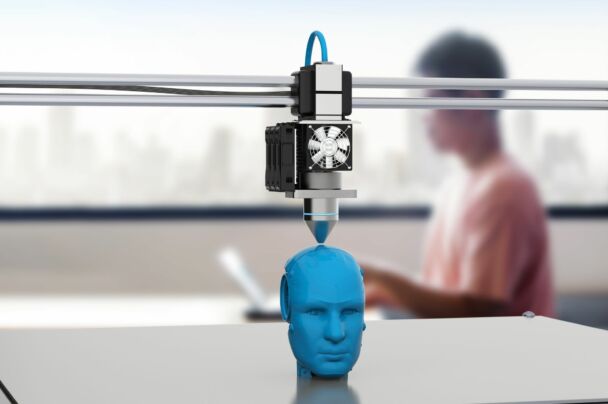
- Exploit AI (Artificial Intelligence) tools in their classes;
- Distinguish AR and VR technologies and use them effectively to create engaging lesson plans;
- Use AR tools to connect real life with computer-generated content;
- Get benefits from VR tools to visualize places, living things, life in the past, etc;
- Recognize the 3D Printers and how they work;
- Get familiar with the 3D Modeling websites and experience prototyping a 3D object;
- Generate projects, activities, and lessons enriched with 3D Modeling and Printing.
Description:
The course addresses the challenges of digital technology in daily life, highlighting its impact on time, focus, and well-being, especially for adolescents who are more vulnerable due to their developing cognitive control. Participants will explore classroom activities and school initiatives to promote awareness of digital well-being, helping students manage technology use effectively.
Through hands-on activities, participants will evaluate their own digital habits, share insights, and reflect on strategies to foster open, non-judgmental discussions about technology use in schools. The course focuses on critical threats such as compulsive overuse, its effects on sleep, physical activity, and concentration, as well as the negative impact of social media on identity, body image, and mental health.
By the end, participants will be equipped to engage adolescents on digital habits, understand the attention economy’s influence, and create a balanced, enriching digital environment for students.
Learning objectives:
- Understand how the attention economy
 shapes the design of digital technology in ways that threaten well-being
shapes the design of digital technology in ways that threaten well-being - Develop students’ awareness of the potential harms of technology use
- Create conditions for discussing both the positive and the negative aspects of technology use safely, openly and non-judgmentally in the classroom
- Reduce students’ defensiveness around examining their digital habits
- Guide students to recognize digital habits that have a negative impact on their well-being
- Promote students’ agency to be in control of their on-screen time and to use technology responsibly
- Lead initiatives and create support structures in their schools to foster digital wellbeing.
Description:
The course addresses the pervasive issue of bullying, both in schools and online, highlighting its detrimental effects on mental health, academic performance, and school retention. It aims to equip parents, teachers, students, and school leaders with effective strategies for preventing and addressing aggression.
Participants will engage in diverse activities such as planning school campaigns, designing prevention programs, role-playing, creating videos, and analyzing bullying scenarios to understand participant roles and conflict management techniques.
By the course’s end, attendees will be prepared to handle aggressive behavior, support victims, manage bullies, and foster a calm and inclusive school environment, with knowledge of effective prevention and intervention programs.
Learning objectives:
- Raise and maintain awareness of bullying
- Increase pupils’ interest and motivation towards activities with a preventive character
- Develop pupils’ communication skills
- Encourage pupils to face problems
- Develop pupils’ team spirit
- To get the parents involved in its prevention
- Use educational platforms to promote its prevention
- Reduce the frequency and extent of school aggression
- Encourage students to take a stand against bullying
- Behave properly online
Description:
The course focuses on fostering a supportive school culture by equipping experienced teachers, department heads, and school leaders with mentoring skills. It emphasizes collaboration, professional development, and mutual learning through classroom observation and feedback.
Participants will learn the principles and techniques of mentoring, including active listening, professional communication, formative feedback, and coaching strategies. The sessions involve practical activities like role plays, video analysis, and group discussions, helping mentors build rapport and support teachers at different career stages.
By the end, participants will have a mentoring toolkit, a deeper understanding of their roles, and improved skills to guide mentees in achieving their professional goals, ultimately enriching the school environment for both mentors and teachers.
Learning objectives:
- Differentiate between mentoring and other forms of teacher support and supervision
- Distinguish between class visits for support and observations for assessment
- Design the structure of a post-lesson discussion
- Formulate questions that help self-reflection professional discussions and self-assessment
- Demonstrate skills in active listening
- Act out a mentorial from the perspective of a mentor, a mentee, or an observer
- Differentiate between constructive, formative feedback and evaluative, summative feedback
- Plan a mentoring process for a peer in their own school context
L’objectiu de la mobilitat és que els participants coneguin les pràctiques i investigacions sobre
investigacions sobre
pensament crític aplicat a la intel·ligència artificial i el benestar digital desenvolupades a la
Universitat Friedrich-Alexander (FAU) i l’Institut per a l’Aprenentatge i Innovació (ILI) de
Nuremberg, així com conèixer el procés de formació digital contínua del professorat i el
desenvolupament de projectes #DigComp en la regió de Baviera. Amb aquesta mobilitat, es
pretén que els assessors d’IBSTEAM adquireixin una visió transversal en aquestes àrees, que
podrà integrar-se en els cursos de formació que oferim als docents de les Illes Balears, amb
l’objectiu de potenciar una educació digital ètica i responsable.
La nostra experiència
Durant aquest curs, l’equip del CEP IBSTEAM ha participat en diverses mobilitats internacionals Erasmus+, dins el projecte Empowering educators in the digital age, amb l’objectiu de continuar impulsant la transformació digital, la internacionalització i la millora contínua en l’àmbit educatiu.
Les estades formatives a Nuremberg, Budapest, Dublín, Atenes i Florència han permès observar bones pràctiques, reforçar la competència digital i lingüística del nostre equip, i establir contactes per a futurs projectes de cooperació. S’han treballat àmbits com la IA educativa, el benestar digital, la mentoria docent, la realitat immersiva o la cultura europea, aportant noves eines per aplicar a la formació del professorat i l’acompanyament als centres.
Una experiència enriquidora que reforça el nostre compromís amb una educació oberta, innovadora i connectada amb Europa.
Convocatòria 2023-1-ES01-KA121-SCH-000131575
Darrera actualització: 12/12/24
Segona tanda de convocatòries obertes de beques ERASMUS+ per a personal docent d’IBSTEAM en el marc del projecte 2023-1-ES01-KA121-SCH-000131575. El professorat interessat ha de sol·licitar-ho adjuntant la documentació que es demana en l’annex 1 de la convocatòria fins dia 18 de desembre de 2024 a les 23:59 h.
